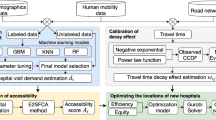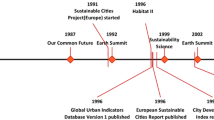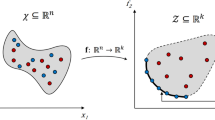Abstract
A statistical measure of information content is used as a means for assessing the effectiveness of a particular monitoring network configuration. This measure is directly related to the precision with which the network can estimate the level of air quality in the region. Each potential site in the network can contribute to an increase in the overall precision of the estimate. The amount of increase is determined by the degree of dependence, displayed by observed pollutant concentrations, between potential sites.
A statistical procedure is used to combine the observed pollution dynamics and the measurement network in order to assess network effectiveness. An iterative application of this procedure leads to the design of the most effective network subject to a specified budget constraint.
Similar content being viewed by others
References
AstromK. J. and EykhoffP.: 1971, ‘System Identification — A Survey’.Automatica 7, 123–162.
Kalman, R. E.: 1960, ‘A New Approach to Linear Filtering and Prediction Problems’,J. Basic Eng., pp. 35–46, March 1960.
Munn, R. E.: 1978, ‘The Design of Air Quality Monitoring Networks’. Institute for Environmental Studies, Univ. of Toronto Pub. No. EE-7.
Ontario Hydro, 1977, ‘Nanticoke GS Air Quality Monitoring Program and 1976 Results’, Sept. 1977, CTSQ-07012-6.
Pickett, E. E. and Whiting, R. G.: 1978a, ‘An Information Content Measure to Evaluate Space-Time Tradeoff in Environmental Monitoring Network Design’. WP 78-007, Dept. of Ind. Eng., Univ. of Toronto.
Pickett, E. E. and Whiting, R. G.: 1978b, ‘Sensor Location and Measurement Scheduling in the Optimal Design of Environmental Monitoring Networks’. WP 78-008, Dept. of Ind. Eng., Univ. of Toronto.
SageA. P. and MelsaJ. L.: 1971,System Identification. Academic Press, New York.
Whiting, R. G.: 1979, ‘Design of Air Quality Monitoring Networks: A State Estimation Approach’. Unpublished MASc. Thesis, Dept. of Ind. Eng., Univ. of Toronto.
Author information
Authors and Affiliations
Rights and permissions
About this article
Cite this article
Pickett, E.E., Whiting, R.G. The design of cost-effective air quality monitoring networks. Environ Monit Assess 1, 59–74 (1981). https://doi.org/10.1007/BF00836876
Issue Date:
DOI: https://doi.org/10.1007/BF00836876




